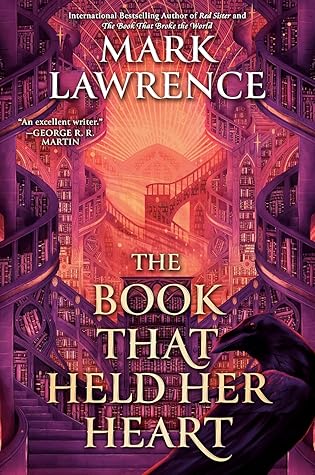More on this book
Community
Kindle Notes & Highlights
Read between
June 13 - June 17, 2025
Her grandfather said that evil men sought to use any difference to create fear, distrust, and hatred, all of which they would employ to advance their own position.
It seems that persecuting a minority is a regrettably common trait among humanity.
“It’s important that there is a memory, and that it can be visited. That doesn’t mean that every memory should be returned to, any more than the existence of a library means you should read every book in it. Exercise discretion. I’ve walked enough of my own past to know it to be a path that will cut you. Even the softest recollection can conceal a blade, if only for the fact that it is gone, and those moments will never be yours again.”
The true value of freedom is revealed only in its absence. It is a structural ingredient whose removal takes with it the colour, taste, and substance of life. A similar effect is observed in gluten-free cakes. Baking to Win, by Joshue Shoe
The library can make sure that nobody has a good excuse for forgetting what happens and striving to prevent repetition. But it cannot stop even that. People have to want to know. I wish I could tell you that free and easy access to information solves these problems—it doesn’t. People find their own wells of poison to drink from.”
So, not intending to rule, the library just gives access. The truth is there on the shelf. You just have to reach out and take it. Information is like water—without it you won’t live long, too much and you’ll drown. And there’s a difference between truth and information. Even correct information is not the same as truth—truth does not mislead—correct information bereft of context can be more dangerous than a lie.”
“But it is important to note that those preparing to carry out such horror, those who want to lead humanity down the darkest paths it can walk—their first instinct is to burn books, ban books, close the gates of information, allow no voices of dissent.”
The library, Anne had come to think, was an imperfect reflection of something divine, a shadow of the impossible. It was shaped by bias, prejudice, and held within its pages every human failing. And yet, in its conception and in its ideals there ran an echo of some great song that if it could only be heard would wrap every listener in its beauty and lift them to some higher, unattainable ground.
“Ah, Aristotle. ‘Memory is the scribe of the soul.’ That’s one of his, and he was not wrong. Where I come from,” Yute said, “we call that one Irad.” He indicated the man with the book. “And his brother is Jaspeth.” He turned towards the second figure. “But we all have our own traditions.”
All alphabets are the bones of something holy.
“Yute says that worlds fall to ruin when those who dwell there take into their hands the gates of truth and seek to usher through only what they feel is true or right or proper.”
Nothing scared the librarian more than a wilful refusal to acknowledge facts, the elevation of ignorance to a virtue, the casting of curiosity and intellect as defects of character.
“The accumulation of things as small as dust can build worlds, and the gathering of things as insubstantial as letters can build vast libraries…the mounting weight of the minuscule can break them too.
The question “Is it wrong to punch a Nazi?” raises a range of ethical dilemmas over the use of violence in a good cause. For many people however, the true question is simply how hard should one punch them? Deplorable, by Helen Clintoff
Books, in Evar’s experience, were always trying to show you something. They might shout it into your face, the author’s spittle practically flying from the page, or they might make you work to tease it from a story that seemingly ran in the opposite direction. But whatever their approach, books would, if given the opportunity, lead you to some window in a high tower, or crack open a door you had passed a thousand times and never truly seen, or venture up a mountainside to a rocky shoulder from where an unsuspected vista opened out before you. They would show the reader something, and there, on
...more
Moments of reunion and parting bracket many relationships. It is not unusual for the punctuation in such love sentences to carry more meaning than the words. The Language of Love, by Anne Le Knocks
“We humans are very good at forgetting uncomfortable truths.”
He took the tiny, delicious cake and held it close to his heart, and understood why the laws of time should not be broken.
First steps are important and are frequently the occasion for celebration. Last steps often go unnoticed. Few of us believe that when we take to our beds we will not rise again. Cobblers: The Importance of Good Shoes, by Arnold Shoemaker


